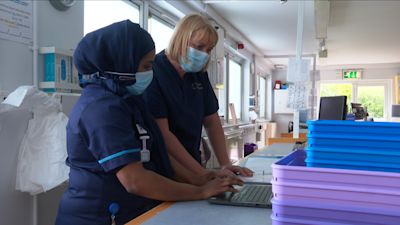New plan unveiled to boost cancer research for patients in Wales

A plan has been unveiled to boost cancer research for patients in Wales and bring in vital research funding.
The nations first ever Cancer Research Strategy has been put together by a group of expert researchers and clinicians and with input from patients and the public.
Those behind it say the goal is to build on the best of the research being done already to increase the depth and amount of research activity in Wales.
Wales currently attracts less than half its proportionate population share of funding from UK cancer funders and securing funding is increasingly competitive.
The ambition in creating this strategy is to attract additional funding for research by focussing on six key research themes where there is already a track record of excellence in Wales.
precision & mechanistic oncology: looking at how genetics can affect who gets cancer, how that cancer behaves, and finding ways to treat cancers with particular genetic ‘signatures’
immuno-oncology: understanding how our bodies’ immune responses change when cancer develops, and finding ways to use the immune system to help fight cancer
radiotherapy: exploring how radiotherapy can kill cancer cells while limiting the impact on the rest of the body
cancer clinical trials: bringing promising new treatments to patients in trials and testing new ways of giving existing treatments
palliative & supportive oncology: finding the best ways to look after patients with cancer, such as pain control, side effect management and mental health support
population health-based cancer prevention, early diagnosis, primary care & health services research: finding new ways to prevent cancer and detect it early, and making sure that health services in Wales are underpinned by strong science
Its delivery will be co-ordinated by the Wales Cancer Research Centre, which is funded by Welsh Government through Health and Care Research Wales.
Professor Mererid Evans, Director of the Wales Cancer Research Centre, says,
“We can achieve so much by working together. Our goal is to unite those involved in cancer research in Wales so that we can deliver real progress.
This will pave the way for further trailblazing studies and trials, important collaborations with industry and academia, and more equitable access to trials. Above all, we will not lose sight of who we are working for - patients and the public across Wales and beyond.”
She told ITV Cymru Wales that the success of the strategy will be measured in a number of ways:
People who have been through cancer treatment have contributed to the development of the strategy.
Julie Hepburn whose from Newport was diagnosed with stage 3b colorectal cancer in 2014, after emergency surgery and chemotherapy she went into remission.
She now works with the Wales Cancer Research Centre as it's lead lay research partner and has played a key role in the design of these plans.
She says, "As lay people we do a very valuable job by offering a different perspective to researchers and speaking up for patients. I was delighted to be involved with the development of CReSt. It is such an important piece of work and I really feel as if my input was listened to."
Julie believes early detection is one of the most important areas:
The strategy is backed by the Minister for Health and Social Services Eluned Morgan, she has stressed the importance of focussing on areas in which Welsh research is nationally and internationally competitive in order to secure more funding.
She says, "I am delighted to see that the Welsh cancer research community has responded to this challenge by coming together to produce and endorse this new strategy. It is a document that recognises both current and emerging strengths.
"In setting out our ‘USP’, I hope that research funders across the UK will be encouraged to invest, and that researchers will be attracted to Wales excited to be playing their part in our research effort."